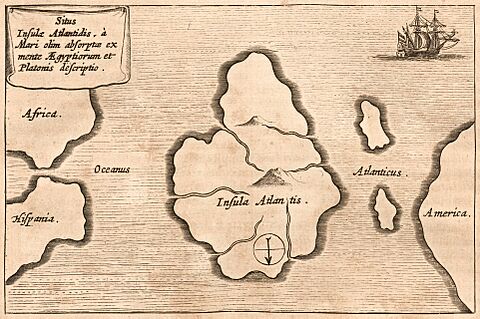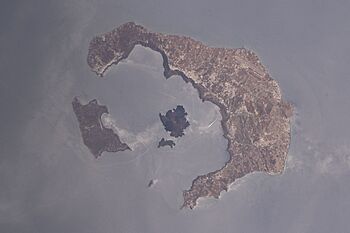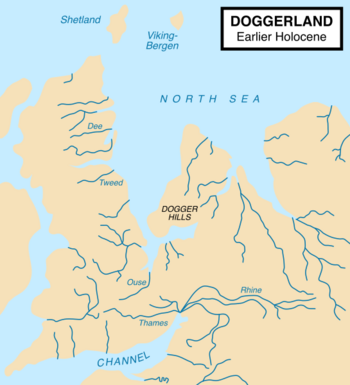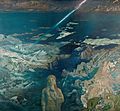Atlantis facts for kids

Atlantis (which means "island of Atlas" in ancient Greek) is a famous fictional island. It was first mentioned by the ancient Greek philosopher Plato in his books Timaeus and Critias. In Plato's story, Atlantis was a powerful empire with a strong navy. It ruled over many western parts of the known world.
However, Atlantis tried to conquer "Ancient Athens" and failed. Because of this, the gods became angry with Atlantis. The island then sank into the Atlantic Ocean. Even though Atlantis is only a small part of Plato's writings, its story has become very popular. Plato said Atlantis existed more than 9,000 years before his time and was "beyond the Pillars of Hercules" (which are the Strait of Gibraltar). These vague clues have led to many unproven ideas about where Atlantis might have been. Today, Atlantis is a symbol for any advanced, lost civilization from ancient times. It still inspires many stories, from comic books to movies.
Contents
Where Could Atlantis Be?
Many people have suggested different places for Atlantis. These suggested locations often share some things with Plato's story. For example, they might be near water, have experienced a big disaster, or fit the time period. However, no one has ever proven that any of these places are the real Atlantis.
Near the Mediterranean Sea
Most of the places suggested for Atlantis are in or around the Mediterranean Sea. These include islands like Sardinia, Crete, Santorini (also called Thera), Sicily, Cyprus, and Malta. Some people have also suggested ancient cities or states on land, such as Troy in Turkey, Tartessos in Spain, or places in Israel or northwestern Africa.

One popular idea links Atlantis to the Thera eruption. This huge volcanic eruption happened around 1600 BC. It caused a massive tsunami (a giant wave) that might have destroyed the Minoan civilization on the nearby island of Crete. Some experts believe this disaster could have inspired Plato's story of Atlantis sinking.
In the Atlantic Ocean
Many people think Atlantis must be in the Atlantic Ocean because of the similar name. Popular stories often place it there. The Canary Islands and Madeira Islands have been suggested. They are west of the Strait of Gibraltar but still close to the Mediterranean Sea. However, studies show these islands have been slowly rising for millions of years, not sinking.
Other islands in the Atlantic, like the Azores, have also been named. The submerged island of Spartel, near the Strait of Gibraltar, is another idea.
In Europe
Some theories place Atlantis in northern Europe. One idea is Doggerland, a land bridge that once connected Great Britain to mainland Europe in the North Sea. Doggerland was flooded by a huge tsunami around 6100 BC.
In 2011, a team working on a TV show claimed to have found possible signs of Atlantis in southwestern Andalusia, Spain. They thought it might be in the Doñana National Park, an area that used to be a large lake. They suggested Atlantis was destroyed by a tsunami, based on earlier Spanish research. However, Spanish scientists have said that these claims are over-the-top and not fully supported by their work.
Atlantis in Popular Culture
Over hundreds of years, the story of Atlantis has inspired many artists, musicians, and writers. It continues to be a popular theme in books, movies, and video games today.
-
Léon Bakst's painting Terror Antiquus, showing a vision of a cosmic disaster.
See also
 In Spanish: Atlántida para niños
In Spanish: Atlántida para niños
- Mythology:
- Antillia
- Avalon
- Brasil (mythical island)
- Brittia
- Cantre'r Gwaelod
- Iram of the Pillars
- Lemuria (continent)
- List of mythological places
- Mayda
- Mu (lost continent)
- Numenor
- Saint Brendan's Island
- Sandy Island, New Caledonia
- Thule
- Ys
Underwater geography:
- Yonaguni Monument
- Bimini Road
Other:
- Atlantis in comics
- Doggerland
- Hidden Worlds
- Kumari Kandam
- List of lost lands
- Minoan eruption
 | Audre Lorde |
 | John Berry Meachum |
 | Ferdinand Lee Barnett |






